里克霍兹医生 把自己的一生奉献给穷人
Posted on Saturday, April 21st, 2012 and under 其他.Warning: Undefined variable $before in /home3/myrunners/public_html/itudia.com/share/wp-content/themes/sim/single.php on line 19
Warning: Undefined variable $sep in /home3/myrunners/public_html/itudia.com/share/wp-content/themes/sim/single.php on line 19
Warning: Undefined variable $after in /home3/myrunners/public_html/itudia.com/share/wp-content/themes/sim/single.php on line 19
Tags: 里克霍兹
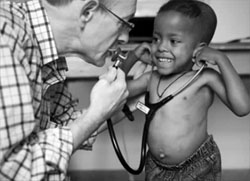 在非洲的伊索比亚(Ethiopia),每四万人中才有一名医生,药物更是永远不足够。这个国家每年国民平均只有二百二十美元现在医疗资源大部分由富人独享。然而,在德蕾莎修女(Mother Teresa)创办的<仁爱之家>(Missionaries of Charity),里克 霍兹医生(Dr. Rick Hodes)却把自己的一生奉献给穷人,帮助穷人治病。他的人生哲学很简单:“别放弃助人的机会。”
在非洲的伊索比亚(Ethiopia),每四万人中才有一名医生,药物更是永远不足够。这个国家每年国民平均只有二百二十美元现在医疗资源大部分由富人独享。然而,在德蕾莎修女(Mother Teresa)创办的<仁爱之家>(Missionaries of Charity),里克 霍兹医生(Dr. Rick Hodes)却把自己的一生奉献给穷人,帮助穷人治病。他的人生哲学很简单:“别放弃助人的机会。”
霍兹说:“我喜欢帮助那些无人关心的穷人。仁爱之家位于亚的斯贝巴,五十无岁的霍兹来自美国长岛,毕业与约翰.霍普金斯大学,是仁爱之家的资深主治医生。霍兹每天看二十个病人,分文不收。
霍兹的诊所只有一个房间很多患者来之几百里外的乡村,有时坐在卡车的车厢里赶来,因为霍兹总是不留余力的满足他们的需求。
如果患者很需要复杂的医疗条件,他会安排患者免费到海外接受手术,将需要特别照顾的孩子安置在他自己简朴的家里,或者安置在他租来的房子里。他照顾的这些孩子当中,有些是被遗弃而流浪街头的;有些是家里太穷,养不起,除了提供医疗,他还关心孩子的教育,为他们到处张罗医疗与教育费用。
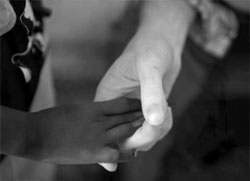 值得一提的是,单身的霍兹收养了五名伊索比亚的儿童,因为是法律容许收养的极限。2001年,他将赛们和狄进这两个孩子纳入他们的医疗保险,以便他们可以到美国德州接受手术。这两个孩子都是孤儿,现在赛们十九岁,狄进十五岁。霍兹回忆到:做这个决定很艰难,我考虑了好几天。最后,我得到的答案是:上帝给你助人的机会,千万别放弃。
值得一提的是,单身的霍兹收养了五名伊索比亚的儿童,因为是法律容许收养的极限。2001年,他将赛们和狄进这两个孩子纳入他们的医疗保险,以便他们可以到美国德州接受手术。这两个孩子都是孤儿,现在赛们十九岁,狄进十五岁。霍兹回忆到:做这个决定很艰难,我考虑了好几天。最后,我得到的答案是:上帝给你助人的机会,千万别放弃。
霍兹擅长治疗癌症,心脏病。一九八四年,伊索比亚遭逢饥荒,霍兹来此参加救灾工作。后来,他获得伏尔布莱特基金的资助,又回到伊索比亚。1990年,霍兹接受美国犹太人联合分配委员会的聘请,担任该组织的医疗主任,负责为计划移民到以色列伊索比亚犹太人的健康把关。
有一次,他寻找一个患心脏病的孩子,偶然发现了仁爱之家。孩子付不起医疗费,从医院跑了,霍兹后来在仁爱之家找到了他,从此,霍兹成了仁爱之家的义工;不久,他便用一半的时间担任义工,一半的时间从事领薪工作。
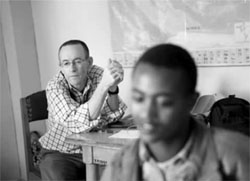 两年前,他开始用自己的薪水或到处筹来到款项资助仁爱之家。现在美国犹太人联合分配委员会协助他筹款,但如果遇到患者没钱坐公车或者没钱吃饭,他还得自己陶腰包。他为那些靠擦鞋养活自己的男孩买鞋油,还为以为寡妇付房租,因为她的女儿需要接受多次脊椎手术。
两年前,他开始用自己的薪水或到处筹来到款项资助仁爱之家。现在美国犹太人联合分配委员会协助他筹款,但如果遇到患者没钱坐公车或者没钱吃饭,他还得自己陶腰包。他为那些靠擦鞋养活自己的男孩买鞋油,还为以为寡妇付房租,因为她的女儿需要接受多次脊椎手术。
纽约大学医疗院小儿科神经主任艾文.费希医生最近走访了仁爱之家,他说:“如果美国行医,霍兹可以过得很好,但他选择了这么一条艰难的路,真是忘我无私。我从未见过像他这样的人。
水龙头里能流出热水,家里总是有稳定的电力供应,这样的生活条件对多数美国人来说理所当然,但霍兹的生活中并没有这样的便利。很多人想寻找一位能与自己共享人生和事业的伴侣,但霍兹似乎已经放弃了这个想法。不过,他并不认为这是牺牲。他最喜欢引用古老犹太法典里的一句话:“拯救一条生命,就等于拯救一个世界。”
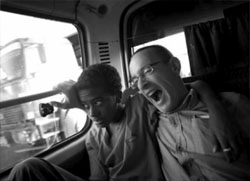 In Ethiopia, there is one doctor for every 40,000 people and never enough medicine. In a nation with a per capita income of $220, modern treatment is reserved largely for the rich. But at Mother Teresa’s Mission, Rick Hodes, MD, devotes himself to healing the poor.
In Ethiopia, there is one doctor for every 40,000 people and never enough medicine. In a nation with a per capita income of $220, modern treatment is reserved largely for the rich. But at Mother Teresa’s Mission, Rick Hodes, MD, devotes himself to healing the poor.
“I like helping people nobody else is interested in,” says Hodes, 55, the senior attending physician at the mission, in Addis Ababa. A native of Long Island who trained at Johns Hopkins University, he sees 20 adults and children a day at no cost to them. Many travel hundreds of miles from remote villages, sometimes in the backs of trucks, to his one-room clinic, where he stops at nothing to get them what they need.
If his patients require sophisticated medication, he hunts it down. He arranges free surgeries abroad. He moves kids who need special care into his own modest home (three bedrooms inside, three in an outbuilding) or another that he rents nearby. “Whenever half a mattress is free,” he says, “I take in someone new.” Some are abandoned kids who live on the streets; others come from families who can’t feed them. In addition to providing medical treatment, he oversees the children’s education, lining up donors to pay for both.
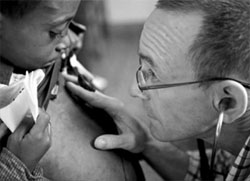 Most striking of all, Hodes, who is single, has adopted five Ethiopian children, the maximum allowed. He started in 2001 to put two orphans—Semegn, now 19, and Dejene, 15—on his insurance plan so they could have surgery in Texas. “It was kind of a scary decision, so I thought about it for a few days,” Hodes recalls. “The answer that came to me was, God is offering you an opportunity to help these boys. Don’t say no.”
Most striking of all, Hodes, who is single, has adopted five Ethiopian children, the maximum allowed. He started in 2001 to put two orphans—Semegn, now 19, and Dejene, 15—on his insurance plan so they could have surgery in Texas. “It was kind of a scary decision, so I thought about it for a few days,” Hodes recalls. “The answer that came to me was, God is offering you an opportunity to help these boys. Don’t say no.”
A specialist in cancer, heart disease, and spinal conditions, Hodes first went to Ethiopia as a relief worker during the 1984 famine. He returned there on a Fulbright fellowship and in 1990 was hired by the American Jewish Joint Distribution Committee (JDC), a humanitarian group, as medical director for the country, overseeing the health of Ethiopian Jews who planned to immigrate to Israel. He discovered Mother Teresa’s Mission while searching for a teenager he’d been treating for heart disease. When the boy disappeared from the hospital because he couldn’t pay, Hodes tracked him down at the mission. Hodes became a volunteer and was soon spending as much time there as at his salaried job.
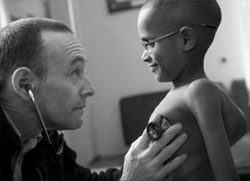 Until two years ago, he financed his mission work out of his paycheck or by begging aid wherever he could find it. Now the JDC helps with fund-raising, but Hodes still digs into his own pocket when a patient needs bus fare or a meal. He buys shoe polish for boys who support themselves by shining shoes. He pays the rent for a widow whose daughter is undergoing multiple spine surgeries.
Until two years ago, he financed his mission work out of his paycheck or by begging aid wherever he could find it. Now the JDC helps with fund-raising, but Hodes still digs into his own pocket when a patient needs bus fare or a meal. He buys shoe polish for boys who support themselves by shining shoes. He pays the rent for a widow whose daughter is undergoing multiple spine surgeries.
“Rick could have done very well for himself practicing in the United States, but he chose to do something so much harder,” says Irving Fish, MD, director of pediatric neurology at New York University Medical School, who visited the mission recently. “He’s totally selfless. I’ve really never met anyone like him.”
Hodes does without comforts most Americans take for granted, like hot water and reliable electricity. He has all but given up on finding a partner with whom to share his life and work. But to him, these aren’t sacrifices. To quote his favorite passage from the Talmud, an ancient book of Jewish law: “Saving one life is like saving an entire world.“

